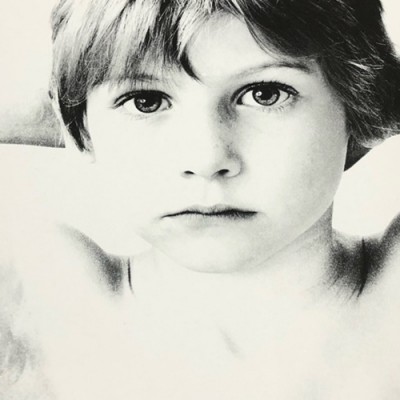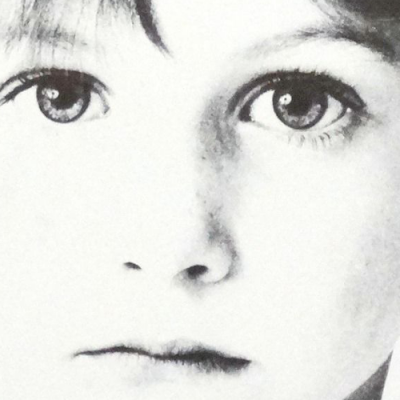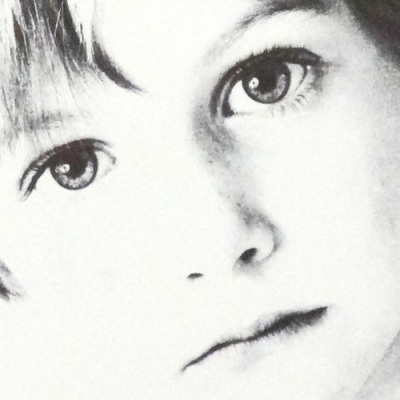Em 1977, ou seja, praticamente ao mesmo tempo em que nascia o U2, nascia em Dublin a Hot Press Magazine, uma revista que de lá até os dias atuais colocaria as suas páginas à serviço da música, em especial da divulgação de artistas irlandeses.

O U2 sempre esteve no radar da Hot Press desde os seus primeiros dias, tendo estampado a sua primeira capa em outubro de 1979, logo após o lançamento do seu primeiro EP "U2-3". Na capa e na entrevista, vemos os garotos Bono, Adam, Larry e Dave (The Edge ainda nem era usado oficialmente pelo guitarrista) em efervescência com o lançamento do seu primeiro trabalho de estúdio, que na época contava com apenas 1.000 cópias. Bono já era aquele que gostava de contar a história por trás de cada letra, a vontade intrínseca de ser cada vez maior.
41 anos depois, o U2 certamente é o maior artista da história da música irlandesa e já esteve na capa da mesma revista por dezenas de vezes.
A Hot Press continua mesmo após tantas mudanças no mercado editorial acontecidas uma marca reconhecidíssima pelas suas matérias e em plena atividade. Colaboraram para suas páginas ao longo dessas décadas nomes como Michael D.Higgins (o nono presidente da Irlanda), Neil McCormick (outra importantíssima pessoa na vida do U2 e mais um dos que tivemos orgulho de entrevistar), Bill Graham, dentre outros. Desde 2002, a revista tem um portal na internet onde também compartilha excelentes artigos, não apenas versões do que está nas bancas, mas outros materiais incríveis.
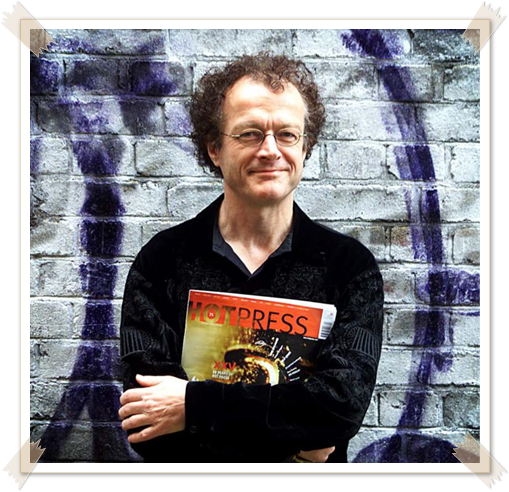
E o nome por trás da Hot Press que está lá desde o seu embrião é justamente o nosso entrevistado: Niall Stokes.
Stokes nasceu em Dublin em 1951. Formado na University College de Dublin em Artes, sempre teve essa paixão por tudo o que fosse nesse campo desde a sua adolescência, tendo inclusive a sua própria banda enquanto era estudante, a Eyeless, que contava com outra pessoa que se tornaria um nome relevante do cenário irlandês: Neil Jordan, um conhecido cineasta.
Antes de fundar a sua revista, foi colaborador de outro grandes veículos como o Irish Times.

Stokes já recebeu diversos prêmios durante a sua carreira, e no início dos anos 2000 foi escolhido pelo Irish Examiner como um dos 50 nomes mais importantes da música irlandesa. Em 2009, durante o Meteor Awards, ele foi condecorado pela sua contribuição à indústria da música e foi homenageado por Tom Dunne, Snow Patrol, Bono e The Edge.
Niall é autor de alguns dos livros favoritos dos fãs sobre a carreira e as músicas da banda: "U2: The Stories Behind Every U2 Song", "U2: Into the Heart: The Stories Behind Every Song" e "U2: Songs + Experience". Em 2014, os assinantes do U2.com receberam como brinde na sua assinatura anual o belíssimo "North Side Story: U2 in Dublin 1978-1983", com curadoria de Stokes.
Em nossa última entrevista para o especial de 40 anos do "Boy", Niall falasobre as suas lembranças dos early days do U2, as capas da revista, o futuro do U2, o cenário musical e sua visão sobre o mercado da música e editorial. Confira!

Como foi seu primeiro contato com o U2 e o que você pensou quando ouviu a banda pela primeira vez?
Houve uma pequena confusão quando o U-2 - como eram conhecidos na época! - ganhou uma competição de bandas em Limerick. Alguns "músicos de verdade" ficaram indignados com o fato de que o que eles viram como um bando de jovens bandidos arrogantes e musicalmente ineptos fora aprovado pelos jurados. Essa foi a primeira coisa que escrevemos sobre Paul, Adam, Larry e David na Hot Press. Mas eles estiveram em contato desde o início, tentando fazer amigos e influenciar pessoas - então falaram com Bill Graham, da Hot Press, que logo se interessou por eles. A partir de então, eles tocaram para uma simpática galeria da Hot Press.
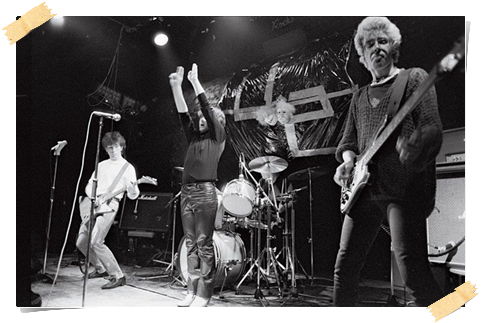
O que você via de diferente no U2 em relação às outras bandas da época? Você via potencial para se tornarem uma das grandes bandas?
Eles tinham um tipo de energia especial. Eles estavam dispostos a correr riscos artisticamente. Eles estavam curiosos. E eles eram ambiciosos. O Boomtown Rats tinham acabado de passar de tocar no Moran’s Hotel em Dublin para ter sucesso e estrelar no Top of the Pops, na BBC no Reino Unido – então, de uma certa forma, tudo parecia possível. Mas, realmente, ninguém tinha ideia de quanto tempo isso duraria, ou quão emocionante a carreira do U2 - e sua arte - iria se desenvolver.

Como eram os shows da banda naquela época? Algum marcante para você até hoje?
As pessoas falam sobre os shows no Dandelion Market, do qual escrevemos uma review na época. Mas estou mais inclinado a me lembrar da série Jingle Balls em McGonagle's. A banda teve uma grande atitude em que eles estavam dispostos a tentar - e falhar. Havia uma teatralidade sobre o U2 naquela época, que se tornou underground até certo ponto quando eles gravaram "Boy", e só ressurgiu totalmente em "Achtung Baby". Estes foram ótimos shows.
O que você lembra da época do lançamento de "Boy"? Você o considera um bom álbum de estreia?
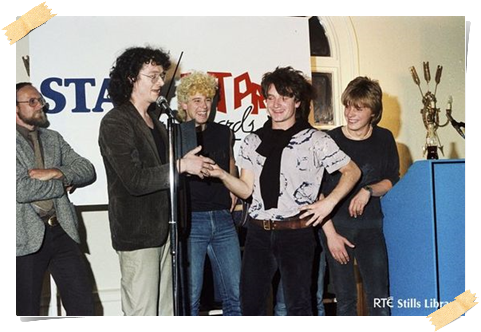
Já tínhamos colocado o U2 na capa na época do lançamento de seu primeiro EP, o "U23", em setembro de 1979. Então, tínhamos acertado em cheio. Pensávamos que a banda tinha algo muito especial a oferecer. O "Boy" confirmou isso. Declan Lynch escreveu uma review e ele era duro, difícil de satisfazer. Mas ele amou o disco. Era o som de uma banda dando um grande salto no desconhecido, e fazendo isso em um estilo espetacular. É uma ótima estreia por todos os tipos de razões, mas principalmente porque foi realmente distinto. Desde o início, o U2 soou exatamente como o U2, e mais ninguém.
Como foram as negociações para a primeira capa da banda na Hot Press? Conte-nos um pouco sobre a sua entrevista com eles.

Foi uma decisão difícil de fazer. Sabíamos que os fãs do U2 estavam engajados. Sentimos que o U2 estava construindo algo único. Nós realmente gostamos deles como banda e como pessoas. Mas, quando o empresário deles, Paul McGuinness, nos abordou sobre a capa da revista, houve um medo persistente de que ir com eles logo de cara poderia ser um tiro no próprio pé comercialmente. Mas eles construíram uma campanha muito boa em torno do "U2-"3, envolvendo o Dave Fanning Show da rádio RTÉ 2, em escolher a música principal e trabalhar nela. Jackie Hayden, que mais tarde trabalhou com a Hot Press, era o cara de marketing e promoções da gravadora CBS Records (agora Sony Music), e ele nos convenceu de que eles estavam totalmente por trás disso. E assim, deixamos nossos corações governar nossas cabeças - e nunca nos arrependemos nem por um segundo. Gostei muito da entrevista. Eles eram muito diferentes da maioria das bandas na franqueza e sinceridade. Mas eles também podiam rir - o que é muito importante!
Existe alguma curiosidade sobre as outras capas com o U2 que você pode compartilhar conosco?
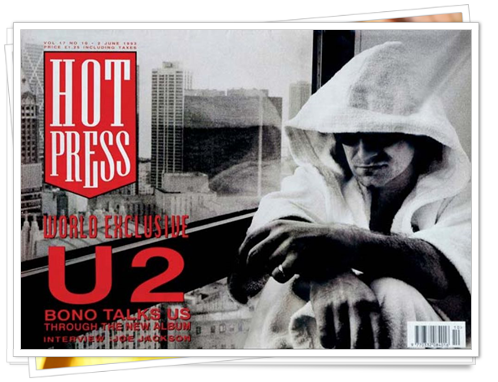
Algumas das capas com U2 estão entre minhas favoritas de todos os tempos. Há em particular uma de 1993, de Bono vestindo um capuz. A foto, tirada por Anton Corbijn, é horizontal em vez de vertical, então nos deparamos com um dilema. Cortá-lo teria arruinado a imagem! Houve um grande debate quando sugeri que viraríamos a revista de lado, reposicionaríamos o logo e iríamos fazer uma capa em formato de paisagem. Como isso ficaria nas bancas? Estaríamos dando um tiro no próprio pé (de novo?)? Só me lembro de uma outra vez em que fizemos isso, mas com aquela foto em particular de Bono funcionou de forma brilhante. Não colocamos nenhum outro título na capa. Não precisava disso. Era uma imagem realmente poderosa e, eu acho, uma ótima capa.
A cultura post-punk se misturou muito com mensagens religiosas, pelo menos no U2, isso foi um diferencial para a banda? Ou os afastaram de outras bandas do cenário? Como você enxergava esta mistura?

Uma das coisas mais marcantes sobre o U2 desde o início é que eles realmente se importavam. Eles se preocupavam intensamente e profundamente com o lugar deles no mundo e com o que tudo isso significava - ou significa. O interesse da banda pela religião fazia parte disso. Quase separou a banda, enquanto Bono e The Edge lutavam com a aparente dicotomia entre seguir os impulsos religiosos e estar em uma banda de rock 'n' roll - mas felizmente eles superaram esse escrúpulo em particular! Como ateu, para mim o que importa é o carinho e o que você faz com isso. Gostei e admirei muito o fato de o U2 não possuir um grama de cinismo.
Olhando num contexto geral, além do U2, as bandas daquela época se apoiavam uma nas outras para divulgação? Havia uma parceria maior entre os músicos, uma vez que as redes sociais nem sequer existiam ainda?

Havia um cenário realmente emocionante emergindo na Irlanda na época. O espírito “faça você mesmo” do punk e da música new wave começou a libertar as pessoas das amarras que as prendiam na Irlanda durante os anos 70. Mudou completamente nos últimos 40 anos, mas a Irlanda era um lugar terrivelmente conservador na época, fechado, retrógrado e severo. Os problemas na Irlanda do Norte aumentaram o sentimento de isolamento, já que bandas internacionais pararam de fazer turnês por aqui. Isso mudou com o punk, com The Clash, The Ramones, The Stranglers e The Jam - para dar alguns exemplos - todos fazendo shows em Dublin. Acho que a chegada do Hot Press também fez uma grande diferença nesse aspecto: para os músicos irlandeses, e especialmente para os jovens aspirantes, havia agora um meio de escrever sobre o trabalho deles. Levando-os a sério. Dando feedback a eles. Além disso, nos recusamos a aceitar o tipo de censura que todas as outras mídias, mais ou menos, internalizaram. Demos aos escritores suas cabeças. Incentivando-os a usar a linguagem como era naquele tempo. Queríamos uma abordagem de espírito livre, mas com um senso de responsabilidade mais profundo, que acho que influenciou pelo menos algumas das bandas. Mas seria errado pensar que tudo era doçura e luz. O U2 foi tratado muito mal por um bando de idiotas excessivamente teimosos, profundamente preconceituosos e, às vezes, francamente, desagradáveis, que pensavam que estavam mais em contato com "o verdadeiro espírito do rock 'n' roll" do que qualquer outra pessoa. A banda era detestada por alguns, porque eram vistos como privilegiados, o que, claro, era um absurdo completo. Na Hot Press, também fomos alvos de alguns desses mesmos indivíduos assustadores. Havia muita agressão e rancor associados ao punk. Mas eles superaram tudo isso muito rapidamente ...
Se você pudesse montar um disco de 10 canções do U2, quais seriam elas?
Muito difícil de responder, tenho receio!
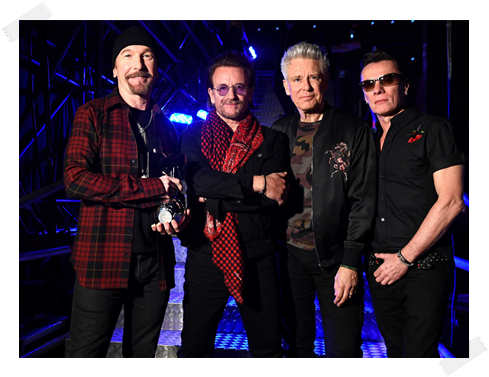
A banda se tornou uma das maiores bandas de todos os tempos, e para isso ocorrer tiveram mudanças de comportamento e de sonoridade, ou seja, o quão diferente é o U2 para você dos anos 80 para hoje?
Olha, eles têm mais de 40 anos de experiência de vida agora, que são transpostos para as canções, melodias, grooves e as performances. Eles se tornaram grandes músicos e, de diferentes maneiras, mestres no ofício. É uma conquista notável que eles tenham sido capazes de permanecer juntos como uma unidade por todos esses anos. Isso fala de alguma continuidade central, e acho que é que eles eram, e ainda são agora, quatro pessoas essencialmente boas e inteligentes que compartilham um respeito mútuo - e uma vontade de viver e deixar viver.
Você acredita que o apoio que você e Bill Graham deram ao U2 no início da carreira foi fundamental para o sucesso da banda?
Honestamente, isso cabe a outra pessoa dizer. Eu sei que tomamos a decisão de apoiá-los. Queríamos que o U2 tivesse sucesso - realmente tivesse sucesso - e queríamos ajudá-los a chegar lá, de qualquer maneira que pudéssemos. Isso não significa ser acrítico. Uma das melhores coisas sobre a banda sempre foi que eles estavam com fome e movidos pelo desejo de se tornarem melhores. Eles queriam aprender e saber mais. Mas acho que é bom para os jovens artistas se sentirem valorizados. E quando eles estavam sendo atacados e alvejados pelos idiotas que mencionei, isso poderia ter sido ainda mais importante.
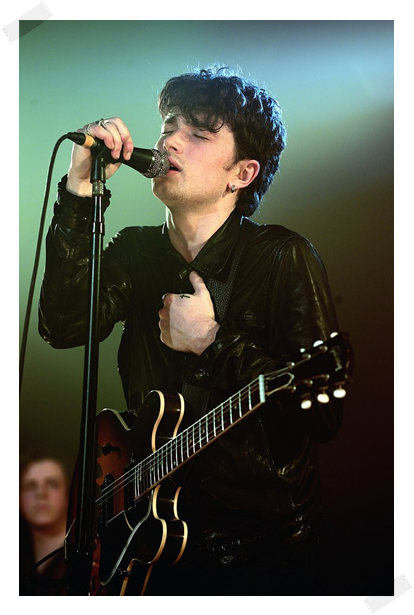
Falando sobre novas bandas, existe algum grupo que te relembra a mesma energia do U2 no início carreira deles?
Eles eram muito jovens quando começaram a fazer barulho. Isso também é verdade para o Inhaler, e com o filho de Bono, Elijah, as comparações envolvidas são inevitáveis - mas acho que são uma proposição muito diferente, já que as pessoas sabem muito mais agora sobre como tudo funciona. As outras bandas novas interessantes que surgiram na Irlanda recentemente - como Fontaines D.C. - são um pouco mais velhas. Mas há uma onda fenomenal de talentos realmente notáveis em todos os gêneros na Irlanda no momento, incluindo trad, folk, spoken-word e hip-hop. Há uma banda de rock feminina de Belfast chamada Dea Matrona que é fenomenal - e pode ser enorme. Malaki, um jovem rapper de Dublin, é realmente brilhante e vale a pena conferir. Há uma sensação crescente de que Denise Chaila - que é uma artista de spoken-word / rap muito inteligente de Limerick - pode ser enorme. Mas isso é apenas a ponta do iceberg.
Você acompanhou a banda por mais de quatro décadas. O que você espera deles para o futuro, acredita que o U2 terá um fim, uma pausa, vão diminuir o ritmo ou a falta do palco para eles é impensável?
Acho que a melhor resposta para isso é que todos nós vamos morrer algum dia. Essa é a única certeza definitiva! Por outro lado, se os Rolling Stones podem continuar fazendo isso, por que não o U2? É brilhante ver jovens artistas surgindo, mas a obsessão pela "juventude" acabou. Acho que "Every Breaking Wave" é uma de suas grandes canções. Eles ainda podem fazer isso, não há dúvida sobre isso.
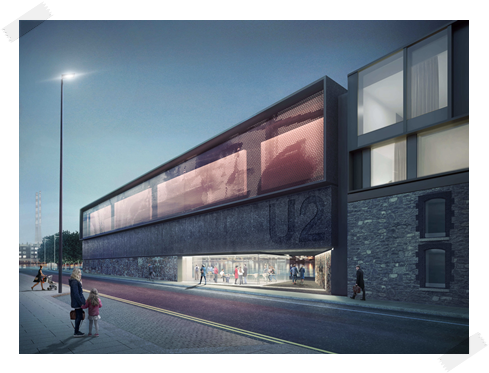
Foi aprovado no ano passado a construção do museu da banda em Dublin. O que você espera dessa nova atração? Eles já entraram em contato contigo para expor algum material?
Acho que tudo foi atrapalhado pelo advento da Covid-19. O que você pode dizer com certeza sobre o U2 é que eles pretendem fazer algo brilhante. E raramente deixam de entregar!
O mercado da música mudou com ela sendo consumida em formato digital. O editorial foi para o mesmo caminho, mudando agora basicamente apenas para o virtual. Você vê algum paralelo entre os dois mercados? E como você se adaptou a isso?
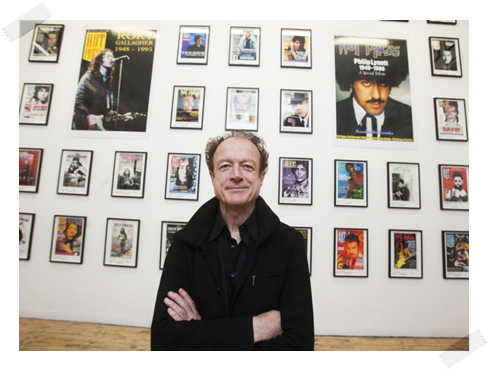
Novamente, tudo está em andamento agora. Ainda estamos publicando na mídia impressa, mensalmente - e cada vez que vamos às ruas com uma nova edição, a resposta é fantástica. Eu acho que há muitas pessoas que - assim como o vinil - gostam de ter algo em que se agarrar, apreciar a aparência e a sensação - e que percebem que o que é lido impresso tende a ficar com eles por mais tempo. A resposta às nossas edições com U2, de fãs de todo o mundo, tem sido ótima - que continue.
O que te motivou a escrever um livro sobre o significado das letras do U2? Quais foram os desafios de coletar material ao longo de 40 anos de história? Bono alguma vez te disse a opinião dele sobre o livro?

Eu sou um compositor e sempre fui fascinado pelo processo, a maneira como uma música ou uma ideia pode surgir furtivamente em você; o caminho - de vez em quando - você pode ouvir tudo em sua cabeça desde o início, e outros é apenas uma frase ou um título ou um refrão que incomoda você. E é claro que sou fã do U2 e estou fascinado com o que eles têm feito, como escritores e como artistas. Acho que a jornada deles foi particularmente interessante porque quando eles estavam começando, Bono estava inclinado a escrever "no microfone" - na esperança, eu acho, de que ele possa encontrar aquele lugar onde alguma outra força fala através de você. Isso ainda faz parte do processo, é claro. Todo compositor, em algum estágio, sente que a canção está se escrevendo sozinha e que você é apenas o meio pelo qual ela abre caminho para o mundo. Mas isso também não é verdade. Certamente, com o U2, as canções tornaram-se melhores e mais duradouras quando Bono começou a formar uma letra completa, quando ele colocou mais tempo, pensamento, esforço e energia na elaboração das letras do que tinha sido o caso durante os primeiros dias. Existe um clichê na música que se resume na noção esnobe de "prefiro as primeiras coisas". Na verdade - qualquer que seja o trabalho que estejamos fazendo - a lógica é que deveríamos e principalmente melhoramos com a experiência. Nem sempre acontece: você pode ver isso no esporte, no qual jovens talentos brilhantes muitas vezes fracassam depois de alguns anos. Mas se estivermos abertos e aprendendo, e evitarmos as armadilhas da autoindulgência ou do abuso de substâncias, então podemos entender gradualmente como maximizar melhor o dividendo criativo e artístico sobre nosso talento. Isso aconteceu com o U2, e todos nós devemos ser extremamente gratos por isso.
A Hot Press anunciou o lançamento de uma edição especial sobre o U2 que já se encontra disponível em pré-venda online. Niall gentilmente concedeu um cupom de 10% de desconto exclusivo para os leitores do U2BR na compra de seu livro "U2: Songs + Experience" e para ser usado em toda a loja online da revista. Você também irá encontrar outros livros sobre o U2, edições antigas e autografadas. Basta usar o cupom U2BR.

A equipe do U2BR gostaria de agradecer a gentileza de Niall por aceitar nosso convite e conceder um pouco do seu tempo para falar conosco. Nosso muito obrigado, Niall!
ENGLISH VERSION
In 1977, that is, practically at the same time when U2 was formed, the Hot Press Magazine was born in Dublin, a magazine that from there until the present day would put its pages at the service of music, especially to the promotion of Irish artists.
U2 has always been on the Hot Press radar since its early days, having their first cover in October 1979, shortly after the release of their first EP "U2-3". On the covers and in the interview, we see the boys Bono, Adam, Larry and Dave (The Edge was not even officially used by the guitarist) in effervescence with the release of their first studio work, which at the time had only 1,000 copies. Bono was already the one who liked to tell the story behind each lyric, the intrinsic desire to be bigger and bigger.
41 years later, U2 is certainly the greatest artist in the history of Irish music and has been on the cover of the same magazine dozens of times.
Hot Press continues even after so many changes in the publishing market a brand recognized for its articles and in full activity. Over the course of these decades have collaborated on their pages names like Michael D. Higgins (the ninth president of Ireland), Neil McCormick (another very important person in the life of U2 and one more of whom we were proud to interview), Bill Graham, among others. Since 2002, the magazine has an internet portal where it also shares excellent articles, not just versions of what's on newsstands, but other incredible materials.
And the name behind the Hot Press that has been there since its embryo is precisely our interviewee: Niall Stokes.
Stokes was born in Dublin in 1951. Graduated from University College Dublin in Arts, he has always had this passion for everything in this field since his adolescence, including his own band while he was a student, Eyeless, who had someone else that would become a relevant name on the Irish scene: Neil Jordan, a well-known filmmaker.
Before founding his magazine, he was a contributor to other major media such as the Irish Times.
Stokes has received several awards during his career, and in the early 2000s he was chosen by the Irish Examiner as one of the 50 most important names in Irish music. In 2009, during the Meteor Awards, he was awarded for his contribution to the music industry and was honored by Tom Dunne, Snow Patrol, Bono and The Edge.
Niall is the author of some of the fan favorite books about the band's career and songs: "U2: The Stories Behind Every U2 Song", "U2: Into the Heart: The Stories Behind Every Song" and "U2: Songs + Experience ". In 2014, U2.com subscribers received as a gift in their annual subscription the beautiful "North Side Story: U2 in Dublin 1978-1983", curated by Stokes.
In our last interview for our 40-year special of "Boy", Niall talks about his memories of U2's early days, the covers of the magazine, the future of U2, the music scene and his vision of the music and editorial market. Check it out below!
How was your first contact with U2 and what did you think when you first heard them?
There was a bit of a kerfuffle when U-2 – as they were known at the time! – won a band competition in Limerick. Some ‘real musicians’ were outraged at the time that what they saw as a bunch of snotty and musically inept young new wavers had been given the nod by the judges. That was the first item we wrote about Paul, Adam, Larry and David in Hot Press. But they were in touch from early on, trying to win friends and influence people – and so they spoke to Bill Graham of Hot Press, who took an early interest in them. From then on, they were playing to a sympathetic gallery in Hot Press.
How different U2 was at the begging in comparison to other bands? Did you picture them as a successful band?
They had a special kind of energy. They were willing to take risks artistically. They were curious. And they were ambitious. The Boomtown Rats had just gone from playing Moran’s Hotel in Dublin to having hits and starring on Top of the Pops, on BBC in the UK – so on one level anything seemed possible. But, really, no one had any idea how long it would last, or how thrillingly U2’s career – and their art – would develop.
How were their first gigs? Do you have any remarkable gig from the early times?
People talk about the gigs in the Dandelion Market, which we reviewed at the time. But I am more inclined to remember the Jingle Balls series in McGonagle’s. The band had a great attitude in that they were willing to try – and to fail. There was a theatricality about U2 at that time, which went underground to an extent when they recorded Boy, and only resurfaced fully on Achtung Baby. They were great gigs.
What do you remember from the time of "Boy" release? Do you consider it a good debut album?
We had already put U2 on the cover at the time of the release of their first EP, U23, in September 1979. So we had nailed our colours to the mast: we thought the band had something very special to offer. Boy confirmed that. Declan Lynch reviewed it and he was a tough reviewer, hard to satisfy. But he loved the record. It was the sound of a band taking a great leap into the unknown, and doing it in spectacular style. It is a great debut for all sorts of reasons, but most essentially because it was really distinctive. From the start, U2 sounded exactly like U2, and no one else.
How were the negotiations for the band's first cover on Hot Press? Tell us a little about your interview with them.
It was a tough call to make. We knew that their fans were committed. We felt U2 were building something unique. We really liked them as a band and as people. But, when their manager Paul McGuinness approached us about it being a cover, there was a nagging fear that to go with them on the front might be shooting ourselves in the foot commercially. But they built a really good campaign around U23, getting the Dave Fanning Show on RTÉ 2fm involved in picking the lead track and generally working the turf very effectively. Jackie Hayden, who later worked with Hot Press, was the marketing and promotions guy in the record company, CBS Records (now Sony Music), and he convinced us that they were fully behind it. And so we let our hearts rule our heads – and never regretted it even for one second. I really enjoyed the interview. They were very different to most bands in their openness and their sincerity. But they were capable of having a laugh too – which is very important!
Is there any curiosity about the other U2 covers that you can share with us?
Some of our U2 covers are among my all-time favourites. There is in particular one from 1993, of Bono in a cowl. The picture, taken by Anton Corbijn, is a horizontal rather than a vertical one, so we were faced with a dilemma. To have cropped it would have ruined the picture! There was a big debate when I suggested that we’d turn the magazine on its side, reposition the logo, and do a landscape cover. How would that be positioned on the news stands? Would we be shooting ourselves in the foot (again?). I can only remember one other time we did it, but with that particular shot of Bono it worked brilliantly. We didn’t put any other headline on the cover. It didn’t need it. It was a really powerful image and, I think, made a great cover.
The post-punk culture mixed a lot with religious messages, at least U2 did. Was that an advantage for the band? Or have it taken them away from other bands in the scene? How did you see this mixture?
One of the most striking things about U2 from the outset was that they really cared. They cared intensely and deeply about their place in the world, and what it all meant – or means. Their interest in religion was a part of that. It almost split the band, as Bono and The Edge wrestled with the apparent dichotomy between pursuing their religious impulses and being in a rock ’n’ roll band – but thankfully they got over that particular scruple! As an atheist, for me the bit that matters is the caring, and what you do with that. I liked and greatly admired the fact that U2 didn’t possess an ounce of cynicism.
Looking at a general context, in addition to U2 the bands of that time supported each other to promote themselves? Was there a greater partnership between the musicians since social networks didn't even exist yet?
There was a really exciting scene emerging in Ireland at the time. The DIY ethos of punk and new wave music had started to liberate people from the shackles that had bound them in Ireland through the ‘70s. It has changed completely over the past 40+ years, but Ireland was a horribly conservative place then, enclosed, backward-looking and censorious. The troubles in Northern Ireland had added to the feeling of isolation, as international bands stopped touring here. That changed with punk, with The Clash, The Ramones, The Stranglers and The Jam – to take few examples – all playing Dublin gigs. I think the arrival of Hot Press also made a huge difference in this regard: for Irish musicians, and especially for young aspiring ones, there was now a medium writing about their work. Taking them seriously. Giving them feedback. In addition to which, we refused to accept the kind of censorship that all other media, more or less, had internalised. We gave writers their head. Encouraged them to use the vernacular. We wanted a free-spirited approach, but one with a deeper sense of responsibility, that I think rubbed off on at least some of the bands. But it would be wrong to think that it was all sweetness and light. U2 were treated very badly by a bunch of over-opinionated, deeply prejudiced and sometimes downright nasty knuckleheads, who thought they were more in touch with “the true spirit of rock ’n’ roll” than everyone else. The band were disliked by some, because they were seen as privileged, which of course was complete nonsense. In Hot Press, we were targeted by some of those same, very creepy individuals too. There was a lot of aggression and spite associated with punk. But they rose above all of that very quickly...
If you could make an album with 10 U2 songs, what would they be?
Too hard to answer that one, I’m afraid!
The band became one of the greatest bands of all time, and for that to happen there were changes in behavior and sound, so how different is U2 for you from the 80s to now?
Listen, they have over 40 years of life experience now, which goes into the songs and the melodies and the grooves and the performances. They have become great musicians, and in different ways masters of their craft. It is a remarkable achievement that they have been able to stay together as a unit for all of those years. That does speak of some core continuity, and think it is that they were then, and still are now, four essentially good and intelligent people who have a shared, mutual respect – and a willingness to live and let live.
Do you believe that the support you and Bill Graham gave to U2 at the beginning of their career was essential to the success of the band?
Honestly, that is for someone else to say. I do know that we made a decision to support them. We wanted U2 to be successful – to be really successful – and we wanted to help them to get there, in any way that we could. That didn’t mean being uncritical. One of the great things about the band was always that they were hungry and fired by the desire to become better. They wanted to learn and to know more. But I think it is good for young artists to feel valued. And when they were being attacked and targeted by the knuckleheads I mentioned, that might have been even more important.
Talking about new bands, is there any group that reminds you of the same energy as U2 in their early career?
They were very young, when they first started to make a racket. That’s true of Inhaler too, and with Bono's son Elijah involved comparisons are inevitable – but I think they are a very different proposition, in that people know so much more now about how it all works. The other interesting new bands that have emerged in Ireland recently – like Fontaines D.C. – are generally a bit older. But there’s a phenomenal wave of really remarkable talent across all genres in Ireland at the moment, including in trad, folk, spoken word and hip-hop. There’s an all-female rock band from Belfast called Dea Matrona who are phenomenal – and could be huge. Malaki, a young rapper from Dublin, is really brilliant and well worth checking out. There is a growing sense that Denise Chaila – who’s a really smart spoken-word/rap artist from Limerick – could be huge. But that is just the tip of the tip of the iceberg.
You have followed the band for more than four decades. What do you expect from them for the future? Do you believe that U2 will come to an end, give a break, they will slow down, or the lack of a stage for them is unthinkable?
I think the best answer to that is that we are all going to die sometime. That is the only ultimate certainty! On the other hand, if The Rolling Stones can keep doing it, why not U2? It is brilliant to see young artists coming through, but the obsession with ‘youth' is over. I think ‘Every Breaking Wave’ is one of their great songs. They can still do it, there’s no doubt about that.
The construction of the band's museum in Dublin was approved last year. What do you expect from this new attraction? Have they contacted you to exhibit any material yet?
I think everything of that kind has been challenged by the advent of Covid-19. What you can say for sure about U2 is that they will aim to do something brilliant. And they seldom fail to deliver!
The music market has changed being more consumed in a digital format. The editorial went the same way now basically switching only to the virtual. Do you see any parallels between the two markets? How did you adapt to that?
Again, everything is in flux right now. We are still publishing in print, on a monthly basis – and every time we hit the streets with a new issue, the response is fantastic. I think there’s a lot of people who – as with vinyl – like to have something to hold onto, enjoy the look and the feel of – and who intuit that what is read in print tends to stay with them longer. The response to our U2 issues from fans all over the word has been great – long may it continue.
What motivated you to write a book about the meaning of U2 lyrics? What were the challenges of collecting material over 40 years of history? Did Bono ever tell you his opinion about the book?
I’m a songwriter and so I have always been fascinated by the process, the way a song or an idea can sneak up on you; the way – on occasion – you can hear the whole thing in your head from the start, and others it is just a phrase or a title or a chorus that nags at you. And of course I am a fan of U2 and fascinated with what they have done, as writers and as artists. I think their journey has been a particularly interesting one because when they were starting out, Bono was inclined to write ‘on the mike’ – in the hope, I guess, that he might find that place where some other force speaks through you. That is still part of the process of course. Every songwriter at some stage feels that the song is writing itself, and that you are just the medium by which it makes its way into the world. But that is not really true either. Certainly, with U2, their songs became better, and more enduring as songs, when Bono started to fashion a complete lyric, when he put more time, thought, effort and energy into crafting the lyrics than had been the case during the early days. There is a cliche in music which is summarised in the snobbish notion of “I prefer the early stuff.” In truth – whatever job we are doing – the logic is that we should and mostly do get better with experience. It doesn’t always happen: you can see that in sport, where brilliant young talent often flounders after a few years. But if we are open and learning, and avoid the pitfalls of self-indulgence, or substance abuse, then we can gradually understand how better to maximise the creative and artistic dividend on our talent. That has happened with U2, and we should all be extremely grateful for it.
Hot Press has announced the launch of a U2 special edition that is already available to pre-order online. Niall kindly granted an exclusive 10% discount coupon to U2BR readers when purchasing his book "U2: Songs + Experience" and to be used throughout the magazine's online store. You will also find U2 books, old and signed issues. Just use the coupon U2BR.
The U2BR staff would like to thank Niall for his kindness in accepting our invitation and giving a bit of his time to answer our questions. Thank you very much, Niall!

